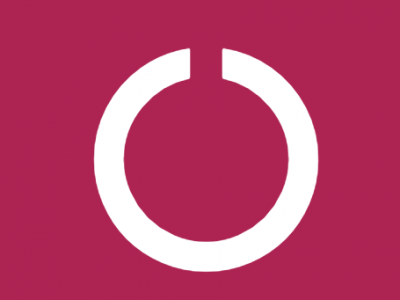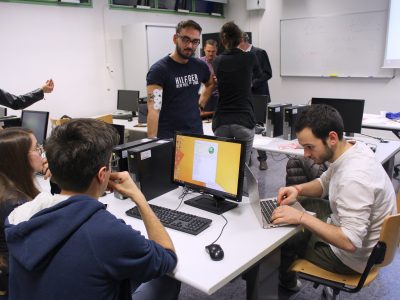




After the graduation:
8% works
92% continues studying
data from: Almalaurea 2020
This track of the Bachelor’s degree, totally taught in English, is open to Italian and International students who aim at starting a solid career in the field of Information and Communication Technologies (ICT). It is distinguished by a methodological and multidisciplinary approach, by providing in-depth training, first in the physical and mathematical fundamentals, and then in the disciplines characterizing Information Engineering: Computer science, Control systems, Electronics, Telecommunications and Bioengineering.
A broad list of optative courses, including high-tech equipped laboratory courses, are also offered so student can personalize her/his training, either by focalizing onto a specific area or by acquiring a multidisciplinary competence.
Students will acquire in-depth knowledge of the physical-mathematical tools and skills that are required to address and solve problems in Information Engineering. Training will then extend to the fundamental methods and the know-how that characterize the various disciplines of ICT. Through a proper selection of optative courses a specialization in a single discipline can be also achieved. Thanks to laboratories courses, in high-tech equipped labs, the practical and experimental skills will also become a part of the graduate’s personal abilities. The Bachelor graduate is then expected to be characterized by strong independence and innovative design skills which will leverage on the knowledge of the state-of-the-art as well as of the most modern instrumentation and methods in ICT engineering.
1) Secondary Studies diploma (or equivalent)
2) Italian admission test for engineering studies TOLC-I (English, online sessions)
It is a test with the following structure:
MATHEMATICS (20 questions in 50 minutes)
LOGICAL REASONING (10 questions in 20 minutes)
SCIENCES (10 questions in 20 minutes)
READING COMPREHENSION (10 questions in 20 minutes)
Maximum score is 50/50; a minimum score of 18/50 is required to be admitted
(NOTE: students not getting at least 24/50 will have to take a Math test as a prerequisite for the exams of Calculus 1 and Linear algebra and geometry).
Further information about the TOLC-I test (Syllabus):
https://www.cisiaonline.it/area-tematica-english-tolc-ingegneria/structure-and-syllabus/
3) Language requirements: English B1 Level (CEFR) or equivalent
However, a B2 level certificate must achieved for admission to year 2.
The professional fields of the graduates in Information Engineering are all sectors of information technology, such as computer engineering, industrial automation, electronics, telecommunications and bioengineering.
Graduates in Information Engineering can work in the design, planning and programming, production and management of ICT systems. Graduates can find employment in enterprises as well as in public administration.
Bachelor graduate students will be also ready to start a Master degree program in any ICT area, in Italian as well as in International Universities. In particular, the Bachelor grants access to the following Master degree programmes at the Department of Information Engineering of the University of Padova: Control System Engineering, Computer Engineering, ICT for Internet and Multimedia, Electronic Engineering and Bioengineering.
The syllabus of courses already activated can be found at:
https://en.didattica.unipd.it/off/2021/LT/IN/IN0513/002PD
YEAR 1
(Mandatory course units)
Calculus 1 (12 ECTS)
Foundations of computer science (12 ECTS)
Linear algebra and geometry (12 ECTS)
Physics 1 (12 ECTS)
Digital systems (9 ECTS)
English (reception skills B2) (3 ECTS)
YEAR 2
(Mandatory course units)
Calculus 2 (9 ECTS)
Data structures and algorithms (9 ECTS)
Physics 2 (9 ECTS)
Probability theory (9 ECTS)
Signals and systems (9 ECTS)
Electric circuits (6 ECTS)
Introduction to machine learning (6 ECTS)
YEAR 3
(Mandatory course units)
Electronics (9 ECTS)
Telecommunications (9 ECTS)
Control theory (9 ECTS)
Algorithms in engineering (6 ECTS) or Information transmission media (6 ECTS)
Free selection courses
(minimum 15 ECTS):
Systems and models (9 ECTS)
Finite state systems (6 ECTS)
Introduction to computer networks (9 ECTS)
Internet and security (9 ECTS)
Digital signal processing (6 ECTS)
Microcontrollers and DSP (9 ECTS)
Selected topics in ICT (6 ECTS)
Free selection laboratory courses (minimum 12 ECTS):
Computer engineering Lab (6 ECTS)
Internet and multimedia Lab (6 ECTS)
Signals and measurements Lab (6 ECTS)
Bioengineering Lab (6 ECTS)
Control systems Lab (6 ECTS)